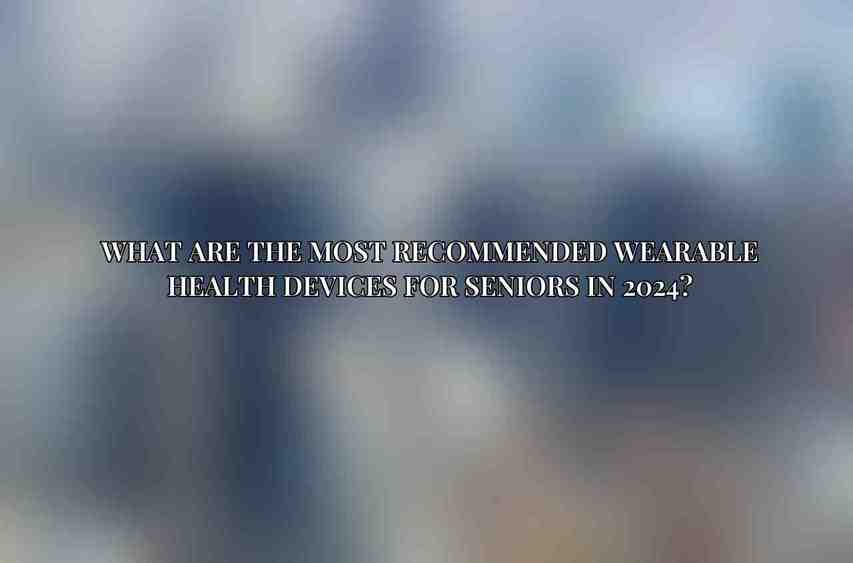Wearable health devices have revolutionized the way individuals monitor their health and well-being. These devices, ranging from smartwatches to fitness trackers, offer a plethora of features that cater to specific health needs. For seniors, wearable health devices play a crucial role in enhancing their quality of life by providing valuable health insights and promoting active lifestyles.
The benefits of wearable health devices for seniors are manifold. Firstly, these devices allow for continuous health monitoring, giving seniors and their caregivers real-time updates on important health metrics. Additionally, wearable devices promote physical activity through features like step tracking and reminders to move, thus encouraging seniors to stay active and maintain their overall well-being. Furthermore, wearable health devices often come equipped with safety features such as fall detection and emergency SOS functions, providing peace of mind for both seniors and their loved ones.
Best Wearable Health Devices for Seniors
Apple Watch Series 8
The Apple Watch Series 8 is a standout choice for seniors looking for comprehensive health tracking features. With an ECG app, blood oxygen sensor, activity tracking capabilities, and fall detection, this smartwatch offers a suite of health-focused tools. While the Apple Watch Series 8 boasts a user-friendly interface and impressive battery life, it may be considered costly and is limited to pairing with an iPhone.
| Pros | Cons |
|---|---|
| Comprehensive health tracking | Expensive |
| User-friendly interface | Requires an iPhone |
| Long battery life |
Fitbit Versa 4
The Fitbit Versa 4 is another excellent choice for seniors seeking a blend of affordability and functionality. With features like heart rate monitoring, sleep tracking, activity tracking, and GPS, the Fitbit Versa 4 offers a range of health insights. While the device is praised for its affordability, comfortable design, and long battery life, it lacks an ECG function and has a smaller display compared to other models.
| Pros | Cons |
|---|---|
| Affordable | No ECG |
| Comfortable to wear | Smaller display |
| Long battery life |
Withings ScanWatch

The Withings ScanWatch stands out for its medical-grade health tracking capabilities and classic watch design. With features like ECG, blood oxygen sensing, sleep apnea detection, and activity tracking, this device offers a comprehensive health monitoring experience. However, the Withings ScanWatch is on the pricier side and may have limited smartwatch functionalities compared to other models.
| Pros | Cons |
|---|---|
| Medical-grade health tracking | Expensive |
| Classic watch design | Limited smartwatch features |
Garmin Venu Sq 2
The Garmin Venu Sq 2 is a budget-friendly option that doesn’t compromise on essential features. With heart rate monitoring, Pulse Ox, activity tracking, and GPS, this device caters to seniors looking for affordability and functionality. The Garmin Venu Sq 2 boasts a bright and clear display along with long battery life. However, it does not feature an ECG and may have limited health tracking capabilities compared to higher-end models.
| Pros | Cons |
|---|---|
| Affordable | No ECG |
| Bright and clear display | Limited health tracking |
| Long battery life |
Amazfit GTS 4 Mini
The Amazfit GTS 4 Mini is a compact and cost-effective option for seniors interested in basic health monitoring features. With heart rate monitoring, SpO2 monitoring, activity tracking, and GPS, this device offers essential health insights in a sleek design. While the Amazfit GTS 4 Mini is praised for its affordability, compact form factor, and long battery life, it does not include an ECG function and may have limited smartwatch functionalities.
| Pros | Cons |
|---|---|
| Affordable | No ECG |
| Compact design | Limited smartwatch features |
| Long battery life |
Factors to Consider When Choosing a Wearable Health Device for Seniors
When selecting a wearable health device for seniors, several factors should be taken into account to ensure the device meets their specific needs and preferences.
- Health tracking capabilities: Seniors should prioritize devices that offer comprehensive health monitoring features such as heart rate monitoring, ECG, and activity tracking.
- Comfort and ease of use: The device should be comfortable to wear for extended periods and have an intuitive interface that is easy for seniors to navigate.
- Battery life: Opt for devices with long battery life to ensure uninterrupted health tracking and usage throughout the day.
- Cost: Consider the affordability of the device while ensuring it meets the necessary health monitoring requirements.
wearable health devices play a vital role in enhancing the well-being and safety of seniors. These devices offer a range of health monitoring features, encourage physical activity, and provide peace of mind for both seniors and their caregivers. When choosing a wearable health device for seniors, it is essential to consider factors like health tracking capabilities, comfort, battery life, and cost to ensure the device meets their specific needs. By leveraging the advanced technology of wearable health devices, seniors can lead healthier and more active lifestyles in the digital age.
For seniors who are interested in adopting wearable health devices, it is crucial to carefully evaluate the features and functionalities offered by each device to select the one that best suits their individual health and lifestyle requirements. As wearable technology continues to evolve, seniors can look forward to even more sophisticated devices that cater to their unique needs and promote better health outcomes.
Frequently Asked Questions
What are the most recommended wearable health devices for seniors in 2024?

The most recommended wearable health devices for seniors in 2024 include smartwatches with health monitoring features, blood pressure monitors, fall detection devices, medication reminders, and activity trackers.
Are these devices easy for seniors to use?
Yes, manufacturers are focused on creating user-friendly wearable health devices for seniors, with large buttons, simple interfaces, and easy setup processes to make them accessible for older users.
Do these devices require a smartphone to function?
While some wearable health devices for seniors may require a smartphone for full functionality, many are designed to work independently or with minimal smartphone interaction to cater to seniors who may not be tech-savvy.
Are these devices covered by insurance or Medicare?
Some wearable health devices for seniors may be covered by insurance or Medicare, depending on the specific policies and requirements. It’s advisable to check with your insurance provider or Medicare to see if these devices are eligible for coverage.
How do these devices protect seniors’ privacy and data security?
Wearable health devices for seniors prioritize privacy and data security by using encryption methods, secure data storage, and ensuring compliance with healthcare privacy regulations like HIPAA to protect users’ sensitive health information.

